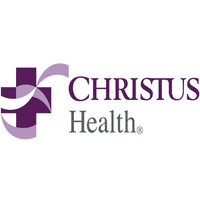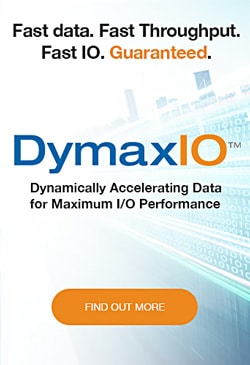Case studies / Christus Health
CHRISTUS Health Doubles Electronic Health Record Performance with DymaxIO Acceleration Software

“We are constantly scrutinizing our budget, so anything that helps us avoid buying more storage hardware for performance or host-related infrastructure is a huge benefit,” —TOM SWEARINGEN, MANAGER, INFRASTRUCTURE SERVICES, CHRISTUS HEALTH
Challenges
- Issues impacting MEDITECH EHR performance
- Needed to achieve performance improvements without an expensive and disruptive rip-and-replace of the existing SAN storage infrastructure
Benefits
- Doubled speed of patient records
- Met application SLAs
- Billing batch jobs dropped from a 20 hour job down to 12 hours
- Avoided a $2 million storage purchase for increased performance
Environment
- MEDITECH EHR
- 2,500 VMs supported by EMC all flash arrays
Features
IntelliWrite® I/O acceleration technology
automatically prevents split I/Os from being generated when a file is typically broken into pieces before write and sequentializes otherwise random I/O generated by the “I/O blender” effect.
IntelliMemory® intelligent caching technology
caches active data from read requests using available server memory.
“Time Saved” Benefits Dashboard shows the ongoing benefit of the software by revealing the amount of I/O offloaded from storage and how much time that saves.
Benefit Analyzer™ embedded benchmark provides before/after performance comparisons prior to installing DymaxIO and after.
The MediWrite™ engine optimizes behavior specific to the MEDITECH platform. MediWrite monitors files for extreme cases of NTFS file fragmentation that could severely impact server and storage performance once the FAL reaches its maximum size limit and causes unnecessary downtime to resolve. MediWrite takes special action on these files to mitigate the problem and, more importantly, proactively prevents extreme cases of fragmentation from occurring in the first place.
CHRISTUS Health enjoys dramatic performance improvement of its MEDITECH application and saves thousands on storage costs after deploying DymaxIO® Acceleration Software.
THE PROBLEM
The move to Electronic Health Records (EHR) results in much needed efficiencies for healthcare providers. However, migrating records and systems is no simple task for a multinational organization like CHRISTUS Health, which operates roughly 350 hospitals, outpatient centers, specialty systems and clinics in the United States, Mexico and South America.
In seeking a data center that can support its ever-evolving operations efficiently, CHRISTUS virtualized its server environment in 2012. “While we have seen some benefits, it unearthed a myriad of software configuration complications. And we also realized about four months into this exercise that we had serious issues impacting our MEDITECH® EHR performance,” says Tom Swearingen, manager, infrastructure services, with San Antonio-based CHRISTUS Health. “As a result, latency, throughput and general sluggishness became a big challenge for us.”
Performance concerns were most prevalent in the hospital system’s 70-plus servers running the MEDITECH EHR application, the lifeblood of the hospital; however, CHRISTUS also looked to improve performance of the MEDITECH medical billing module. The batch processing for billing took place at night so it would be complete by the following morning, but the jobs were extending past the night shift—getting pushed until noon or even consuming the entire day.
Swearingen needed to achieve performance improvements without an expensive and disruptive rip-and-replace of the existing SAN storage infrastructure. “We are constantly scrutinizing our budget, so anything that helps us avoid buying more storage hardware for performance or host-related infrastructure is a huge benefit,” he says.
THE SOLUTION
CHRISTUS turned to DymaxIO from Condusiv Technologies. DymaxIO is a 100% software approach to improving the performance of applications running in a virtual server environment. DymaxIO employs I/O optimization intelligence at the OS layer, as close to the application as possible, and reduces the amount of I/O traffic necessary for any given workload by 50% or more.
“Customers typically see 50% or more acceleration and improvement of overall throughput in the system,” says Brian Morin, SVP, Marketing, Condusiv Technologies.
Whereas the Windows file system typically breaks a file into many pieces before write, with each piece requiring an input/output operation, DymaxIO reorganizes this random pattern and writes files as a single, contiguous I/O, allowing organizations to achieve far greater workload throughput with fewer I/O operations. This also proactively prevents fragmentation from occurring, which is of paramount importance to those who administer the MEDITECH application in regards to both performance and stability.
As a second key component to I/O optimization, DymaxIO also caches hot, common data in available server resources for even greater reduction in I/O traffic to storage—while also reducing response time.
“Customers typically see 50% or more acceleration and improvement of overall throughput in the system,” says Brian Morin, SVP, Marketing, Condusiv Technologies.
“With far fewer I/Os being created, the system can operate on larger datasets in a shorter time,” explains Morin. “DymaxIO is a context-aware controller of the I/O system, operating behind the scenes in real time, and putting very little noticeable footprint on the server,” says Morin. “As a result, we’ve become a favorite in the healthcare space due to the sheer volume of data being managed and the velocity required to serve that data instantly.”
THE PAYOFF
Before deploying DymaxIO, CHRISTUS had plans to purchase roughly $2 million in storage hardware to increase the performance of its MEDITECH application. However, after deploying DymaxIO acceleration software across 70+ servers, performance problems were eliminated overnight and CHRISTUS Health was able to avoid a costly hardware upgrade to its data center.
“Facing a $2 million storage purchase to solve our performance issues didn’t sit well with any of us,” says Swearingen. “We heard what DymaxIO acceleration software had done to help other MEDITECH hospitals, so we were eager to try it for ourselves. After deploying DymaxIO and conducting a before/after performance analysis, we found that DymaxIO doubled the speed of our patient records. DymaxIO provided enough speed to meet our application SLAs, so there was no longer a need to make a $2 million storage purchase for increased performance.”
Swearingen continues, “Condusiv’s DymaxIO didn’t just double the productivity of our patient care without adding new hardware, it enabled us to save on the bottom line and reclaim a storage budget that had ballooned since we virtualized.”
And the medical billing batch processing jobs that were taking an entire day to complete? “DymaxIO brought the billing batch jobs back inside their nighttime window—dropping a 20-hour job down to 12 hours,” Swearingen reports.
DymaxIO for MEDITECH also features the MediWrite™ engine, which proactively eliminates excessive NTFS file fragmentation that can cause the File Attribute List (FAL) to reach its size limit and degrade performance further or even threaten availability. “That’s huge for us,” says Swearingen, “I don’t have to shut anything down because DymaxIO works on live systems and
“Condusiv’s DymaxIO didn’t just double the productivity of our patient care without adding new hardware, it enabled us to save on the bottom line and reclaim a storage budget that had ballooned since we virtualized.” —TOM SWEARINGEN, CHRISTUS HEALTH
proactively keeps the FAL in check.” He adds, “I’m no longer creating remediation strategies in my head—we now have a proactive solution to the FAL issue, along with significant performance gains without having to add more hardware. The benefits were so good that we decided to roll DymaxIO out to the enterprise. Today it sits on over 2,500 VMs supported by EMC all-flash arrays. Couldn’t be a more winning scenario.”

